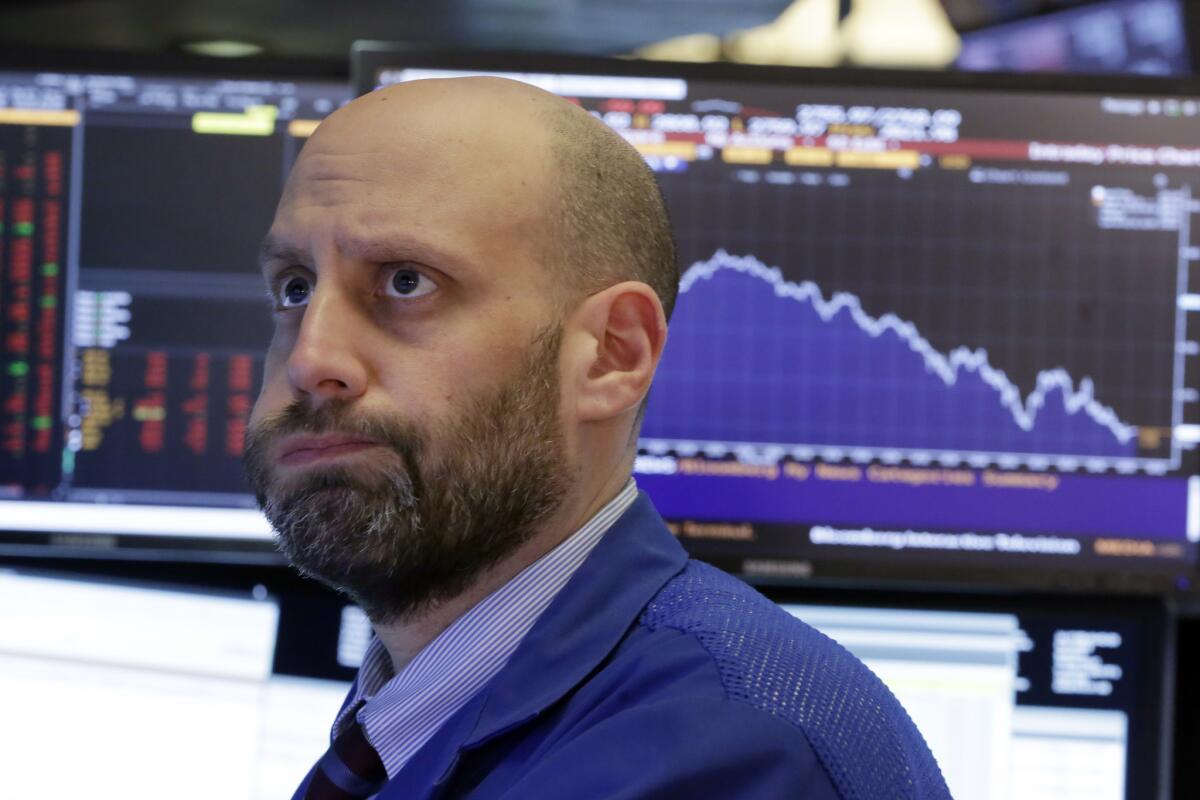Some investors panic over the stock market’s free-fall. Others see a bargain

- Share via
For small investors who had jumped into stocks as the bull market roared into its 11th year, Monday was a full-blown meltdown.
A 2,000-point drop in the Dow Jones industrial average capped the market’s worst day since 2008, as mounting fears of economic damage from the coronavirus combined with an oil price war to raise the odds of a looming recession.
Many investors viewed the carnage with horror. Others eyed bargains.
At the TD Ameritrade office in Torrance on Monday, a TV blasted the bad news. “Pimco: the worst is yet to come for the economy,” read a headline. But one older investor strolled out of the brokerage upbeat: “For me, it’s just an opportunity to buy,” he said.
Not everyone was so sanguine. A few minutes earlier, another older man emerged to say, “I’m scared,” before scurrying off.
Financial advisors urged calm.
“What I am telling clients is they should try to slow down their decision-making at a time like this,” said Patrick Whalen, of Whalen Financial Planning in Los Angeles. “Most of us make better decisions when we are not under stress.”
That’s not so easy when the three major stock indexes are now down about 19% from the record highs they set last month. That’s the edge of bear-market territory, the definition of which is a 20% drop for two months or more.
“It feels like there’s panic in the air and things are happening very fast,” said Ben Carlson, director of Institutional Asset Management at Ritholtz Wealth Management. “A lot of people don’t want to hear this but this is just something that happens in the stock market occasionally. You have to put these kinds of events in the plan. Hopefully you don’t have everything in the stock market.”
For people in or near retirement who are aggressively invested in the stock market, Jim Hebenstreit of ClearView Financial Planning in El Segundo recommended they take the time to meet with an advisor who can better allocate their funds between risky and less-risky investments, such as bonds or bond funds.
Plunges like Monday’s are particularly painful for those already in retirement, as they watch their savings evaporate at exactly the wrong moment. Even so, financial advisors said people shouldn’t rush for the exits.
Hebenstreit noted the stock market can bounce back quickly. If you sell low, you would miss that upswing and lock in your losses. And if you later want to get back in, it will cost you more.
Those who are early in their careers and have some savings should consider treating the market’s plunge as an opportunity, financial advisors said.
“If you have no money in the market, certainly start thinking about putting some of your money to work,” said Steve Nielander, a San Diego State finance lecturer and a partner at wealth management firm Cerity Partners. “As long as one doesn’t have need for their money right away, it’s a good time to invest, and then wait some time for the market to bounce back.”
Prices in some sectors were sharply lower than when the market was at its peak in mid-February, or even last Friday. Marathon Oil shares fell 47% on Monday, and Occidental Petroleum dropped 52%. The biggest banks also took a hit, with Bank of America and JPMorgan Chase falling 14% and 15%.
Those banks pay decent dividends, so their shares at these prices yield far more than Treasury bonds, Nielander noted. The dividend yield on a JPMorgan Chase share is 3.86%, while the yield on the 10-year Treasury note is 0.67%.
“These [banks] are solid names that are going to get through this and be fine,” he said.
Russell Warren, 33, of Albuquerque, N.M., emerged unscathed by the drama Monday. He pulled his money out of the market in 2018, suspecting stocks were overvalued.
Now he sees a buying opportunity. But he plans to wait a bit before jumping in, and he’s worried about his parents and extended family, who are close to retirement age and have a good portion of their money tied up in stocks.
“I think more pain is coming,” he said.
More to Read
Inside the business of entertainment
The Wide Shot brings you news, analysis and insights on everything from streaming wars to production — and what it all means for the future.
You may occasionally receive promotional content from the Los Angeles Times.












